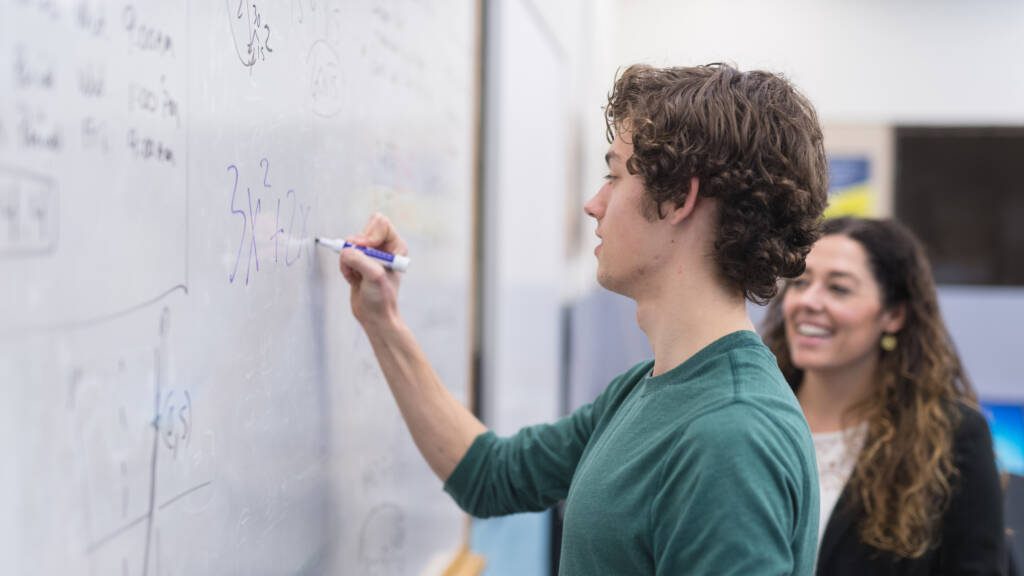It’s one thing not to like math—even hating it is a distinct possibility—but it’s quite another to feel you just aren’t good at it. This belief can make it difficult to learn and improve, especially when it comes to the SAT exam.
The good news is that being innately bad at math is actually a myth. The math we learn in school is relatively new in our evolutionary history. Our brains are not hardwired for it in the same way they are for language—something we learn before even entering a classroom. Math is a skill that has to be developed for every single one of us.
“No one inherently knows how to do calculus or how to deal with adding fractions. We all have to learn at some point,” says Laura Hubbard, director of academics at the online math tutor Everydae. “When kids hear some students are ‘gifted’ and others are ‘struggling,’ they can develop fixed mindsets—that they are either good or not good at math, and that nothing they do is going to change that.”
Fortunately, that’s not the case. It’s very possible to learn math and improve your skills.
Here’s what you can do to challenge your math fears and conquer the math section of the SAT exam.
Be Calculating
Only use a calculator when you’re preparing for the “Math with a Calculator” section. While it seems obvious, practicing for the “No Calculator” section using a calculator isn’t valuable practice. The “No Calculator” section is what trips students up the most, according to Hubbard, and it’s important to replicate test-taking conditions.
It’s so important that Hubbard doesn’t limit replicating test-taking conditions exclusively to study time. She actually recommends not using a calculator at all for a few months. “By the time students are in their junior year, a lot of them have progressed to math classes where they’re allowed (and encouraged) to use a calculator. This is great in class since it allows them to explore complex topics more quickly. But it also means they’re not using their mental and paper math skills as frequently,” says Hubbard. Those basic math skills are tested on the SAT exam. So, be sure your math basics are solid by using them as often as possible.
Learn How to Function
Mastering functions is a surefire way to increase your score. While they can be conceptually difficult to learn, having them under your belt will make a whole category of SAT exam questions a breeze.
If you’re struggling with functions, make sure you’re not also struggling with a more basic skill first. “You can’t suddenly do well on rational functions in Algebra II if you still struggle with adding and subtracting fractions,” says Hubbard.
Once you’re good on the basics, you’ll want to practice, practice, practice. It may take time before functions click, but that’s perfectly normal.

Pace Yourself
There is no substitute for good old-fashioned studying and practice. The more familiar you are with the math section, the less likely you are to be thrown off by a question on test day. Just don’t try to tackle too much at once.
“Doing 10 or 20 minutes of studying five or more times a week is way more effective than trying to do five hours of studying every day,” says Hubbard. “That same bit of advice goes for taking practice tests. You want to make sure you don’t burn through the released tests early and then not have practice materials to work with.” Set a daily schedule for studying and practicing and stick to it.
Consider a Tutor Instead of Prep Class
SAT exam courses are more about test-taking strategies than learning the basics of math. If you struggle with math concepts and are considering spending money on test prep, Hubbard recommends a tutor over a course.
“Prep courses can be great for many students, but they are designed to cram everything in the few weeks before a test,” Hubbard says. She explains that though local tutors may be more expensive per hour, they’re ultimately going to be more cost-effective. The instruction will be tailored to exactly what the student needs to learn. “The good ones will give students a detailed plan that they can follow, so they can continue to study on their own,” Hubbard adds. So, the personalized instruction continues after the sessions, too.
Learning that the best way to increase your score is through plain old practice may not be what you were hoping to hear, but the good news is that practice is something we can all do—no math gene required.
SAT® is a trademark registered by the College Board, which is not affiliated with, and does not endorse, this site.




